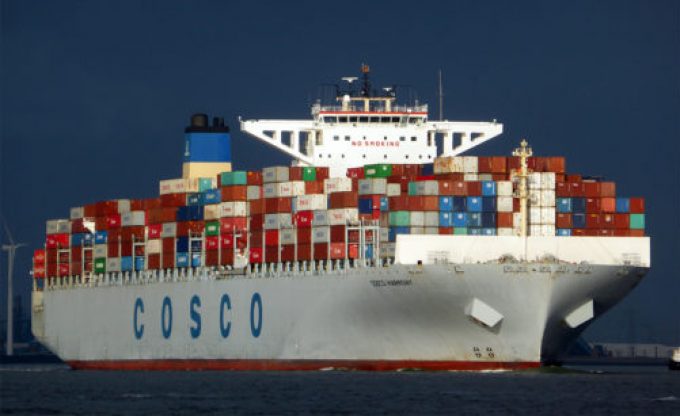US hit by fall in meat exports as China scales back and Brazil steps up
US meat exports are in low gear, affected by bans in the largest market, slowing ...
TFII: SOLID AS USUALMAERSK: WEAKENINGF: FALLING OFF A CLIFFAAPL: 'BOTTLENECK IN MAINLAND CHINA'AAPL: CHINA TRENDSDHL: GROWTH CAPEXR: ANOTHER SOLID DELIVERYMFT: HERE COMES THE FALLDSV: LOOK AT SCHENKER PERFORMANCEUPS: A WAVE OF DOWNGRADES DSV: BARGAIN BINKNX: EARNINGS OUTODFL: RISING AND FALLING AND THEN RISING
TFII: SOLID AS USUALMAERSK: WEAKENINGF: FALLING OFF A CLIFFAAPL: 'BOTTLENECK IN MAINLAND CHINA'AAPL: CHINA TRENDSDHL: GROWTH CAPEXR: ANOTHER SOLID DELIVERYMFT: HERE COMES THE FALLDSV: LOOK AT SCHENKER PERFORMANCEUPS: A WAVE OF DOWNGRADES DSV: BARGAIN BINKNX: EARNINGS OUTODFL: RISING AND FALLING AND THEN RISING

Climate change is providing yet another motivation for investment firms to diversify from China.
Last week, London’s Legal & General Investment Management (LGIM) sold its stake in China’s Cosco, claiming the shipping line had made insufficient efforts to decarbonise.
Senior manager Stephen Beer told The Loadstar: “We expect the shipping sector to introduce operational innovations to increase fuel efficiency in the short term, with low-carbon fuel switching and relevant investment in the long term. Firms that don’t are likely to face rising investor activism.”
LGIM has condemned both Air China and Cosco this year on sustainability grounds, claiming the Chinese firms are showing insufficient leadership on decarbonisation.
“While Cosco Shipping Holdings has an operational target on climate, the level of ambition for this target is low compared with [its] leading peers,” said Mr Beer. “There is also no commitment or investment in low-carbon fuels, which is key to sector decarbonisation.”
Recently The Loadstar has reported on several drives to diversify supply chains from China, with climate issues taking a back seat to concern over the Xi Jinping administration’s handling of Covid-19, as well as security concerns over components such as semiconductors. Carmakers and even mobile phone OEMs are making plans to move their operations to India or Mexico, and meanwhile, the German government fought off an attempt by Cosco to purchase a controlling stake in a terminal at the Port of Hamburg.
Last year, both Cosco and Air China were similarly found to be lagging on sustainability commitments in the World Benchmarking Alliance’s Transport Benchmark report, which ranks companies not on actual emissions, but their perceived level of ambition in tackling decarbonisation. Also near the bottom of the rankings were China Post, China Southern Airlines, China Eastern Airlines and China State Railways Group.
Comment on this article